INVESTIGATION: Uncompleted Old Enugu-Onitsha Road brings untold hardship, tears to commuters, residents of Enugu communities
Ugwu Obinna’s younger sister was killed after a truck driver transporting cows rammed into her shop located at the Okpatu end of the Old Enugu-Onitsha Road this July.
“The driver was trying to dodge the potholes along the road when he lost his break and hit her,” Obinna recalled. “She died on the spot, It was devastating for my family”.
Obinnna is the youth leader of Okpatu. The Old Enugu-Onitsha Road which cuts across his community also connects seven other communities, including Abor, Ukana, Awhum, Umulumgbe, Ukehe, Ogbede and Opi.
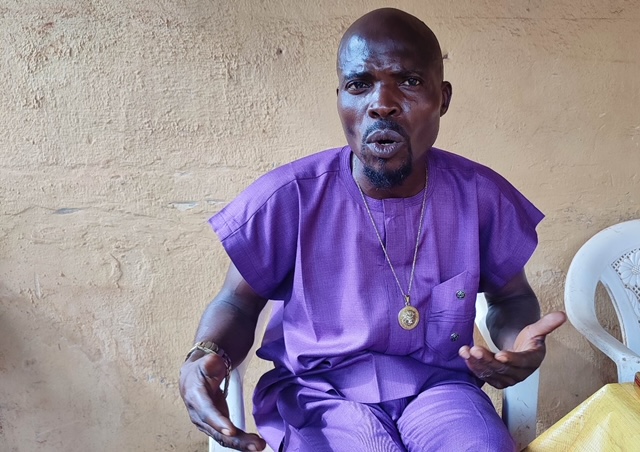
Ugwu Obinna says the situation of the road continues to worsen
For several years now, accidents along the federal road have become a usual occurrence. Residents say women in the community have suffered complications during child birth because it is difficult to access hospitals on time on the road.
Obinna said that several promises by the government has not translated into reality and the road continues to deteriorate with every passing day, making life difficult for both residents of communities and road users.
The award
In May 2019, the Federal Executive Council (FEC) approved contracts for the construction and rehabilitation of 10 roads across the country, sequel to a memorandum presented to it by the Minister of Power, Works and Housing at the time, Babatunde Fashola in the same month.
Hakeem Bello, who was the Special Adviser on Media and Communication to the minister, said that the roads were intended to improve transportation infrastructure and restore the nation’s road network as part of implementation of the Federal Government’s Economic Recovery and Growth plan.
Among the roads approved was the rehabilitation of old Enugu-Onitsha Road covering Opi junction- Ukehe-Okpatu-Aboh Udi-Oji to Anambra Border. The 90 kilometre contract which was awarded to Arab contractors (OSMAN AHMED OSMAN) Nigeria limited for an original contract sum of N31.94bn, (31,946,055,290) had an initial completion date of 24 months under the Federal ministry of works and housing.
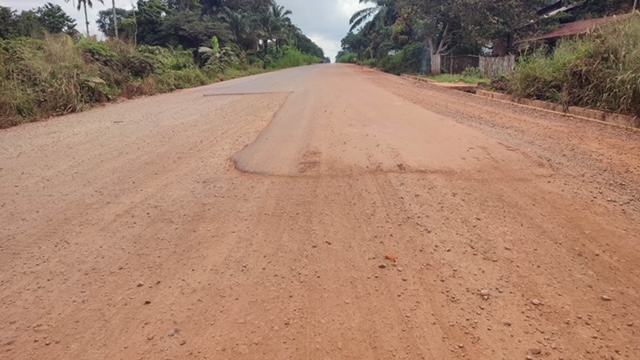
Picture showing where rehabilitation ended before Awhum
When residents of Okpatu and other surrounding communities heard of the contract, they rolled out their drums in celebration. Their expectation was that the road would be completed to ease their sufferings and that of other road users. “We were willing to provide every kind of support needed by the contractor to actualise the project,” Obinna said. “We had suffered for years,”.
Little progress, road uncompleted
Data on the govspend platform showed that between June 2019, one month after the approval and June 2022, Arab contractors Nigeria Ltd received 11 different payments amounting to over 2.3 billion naira (N2,346,759,786) for the project.
Also, data on the website of the Federal Ministry of Works shows that over 11bn (11,231,040,095) has been released on the project so far, with the contract sum also revised to N48.9bn (N48,996,488,926).

The road had been captured under the phase II of the federal road infrastructure Tax Credit Scheme-funded by the NNPC Ltd to ensure the sustainability of funding critical infrastructure in Nigeria. The phase is expected to fund 44 critical road infrastructures to the tune of N1.96 trillion naira.
However, despite the payments made, many sections of the road remain dilapidated. Findings show that from the Anambra border section, a total 30 Kilometres have been executed up to the first layer of ashpalt while only about 26 kilometres have been completed up to the last layer.
From the 9th Mile end of the road, only nine and half kilometres have been completed between Abor and Ukana, taking the total length completed so far to about 36 kilometres out of 90km. But the contractor did not commence construction from 9th Mile axis because of compensation issues.
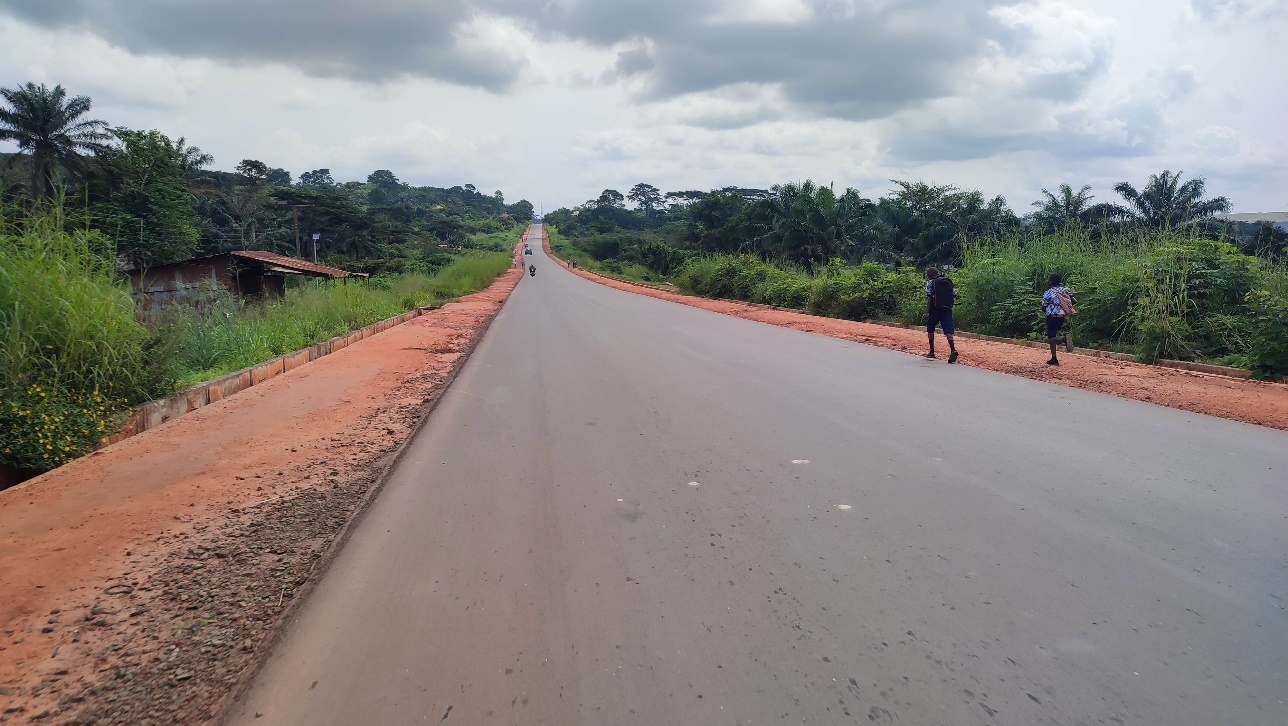
Completed section of the road at Abor
“They had to start where they had the right of way and so they would not need to pay anyone”, said Smart Okpi, assistant chief civil engineer at the Federal Ministry of Works in Enugu.
Findings also showed that although only the Abor and Ukana end of the road have been completed, grading ended at Awhum, which is the next community. But from Okpatu through Umulumbge, Ukehe, Ogbede all the way to Opi had not received any attention.
Also, while some parts of the road till Awhum had drainages on both side, others had only on one side of the road and so, whenever it rains, water gets into shops along the road. Some business owners are having to sand fill front of their shops.
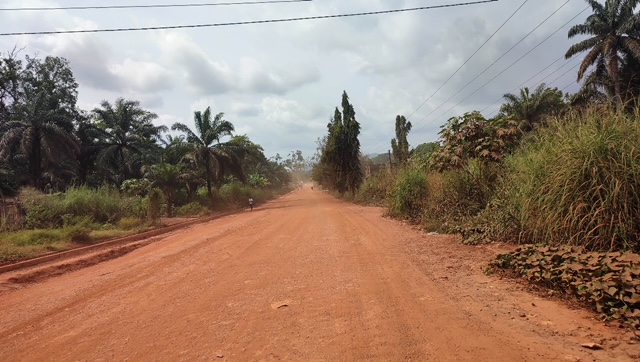
Drainage only on one end of the road.
Reacting to the question of one-sided drainage, Okpi said that in water draining areas and areas where the road is higher, it is not also necessary to have drainages because water can naturally find its way.
Worsening road condition
Residents say Tharp it has been over four months since the contractor graded the Awhum end of the road and abandoned it. A resident of the community, Fredrick Ogbonna said that one of the engineers had said they would resume work by October.
On one end of the road which had not been graded, sharp stones were used to fill up potholes and vehicle owners often have to navigate through to avoid deflating their tires.
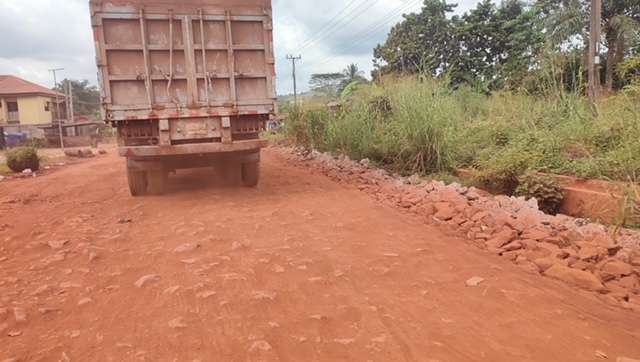
Sharp stones used to adorn part of the road.
Less than 20 minutes away from the old-Enugu Onitsha Road is another federal highway-the 9th Mile-Orokam Road linking Enugu and Benue State- which has completely become unmotorable. As a result, all heavy-duty trucks now ply the old road, further worsening its situation.
Travelling along the road, it is common to see zincs adorned with dusts, white shirts turned to brown and commuters with their hands around their mouths/nose to prevent dust inhalation. Business owners cover their wares with nylon to avoid dust.
“The month has ended and nothing has changed, the road is now worse than it used to be because it sees more trucks and other vehicles now”, said Ogbonna. “The company’s trucks pass the road daily, we don’t know what the plan is,”.
The entire section of the road at Okpatu and other communities yet to be attended to are laden with potholes. Hold ups are a daily occurrence on the road. Sometimes, they stretch to a distance of two kilometres.
Twice every year, Obinna organises youths in Okpatu to clear bushes on both sides of the road to allow community members walk through to the market or their farms as trucks and other vehicles have converted walkways into major roads.
Formerly, he said that youths used to fill the potholes on the road with sand to make it motorable. But they have stopped ever since the road started witnessing an increasing number of trucks to avoid being hit by drivers who might lose control.
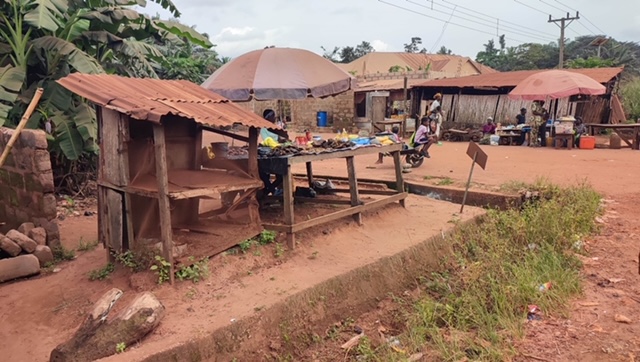
Shop owners along the Okpatu end of the road say it affects their business
Impact on businesses
Ifeoma Amu runs a foodstuff business along the road. Like other business owners, she covers her products with nylon bags yet, dust penetrates through and often discourages buyers.
Sometimes, she hardly makes sales and that affects her income and makes it difficult for her to feed her five children and her husband who has been sick since April.
Formerly, when the road was in good condition, commuters would drop to buy from her. Now, they hardly do. To get to Enugu and back costs over N5000 because of the dilapidated state of the road. When she returns, she adds it to the cost of her foodstuff, making it unaffordable for many residents to buy.
Fredrick Ogbonna, who sells motorcycle parts along the Awhum end of the road, cleans his wares every morning as soon as he comes out due to dust and does not display some of them.
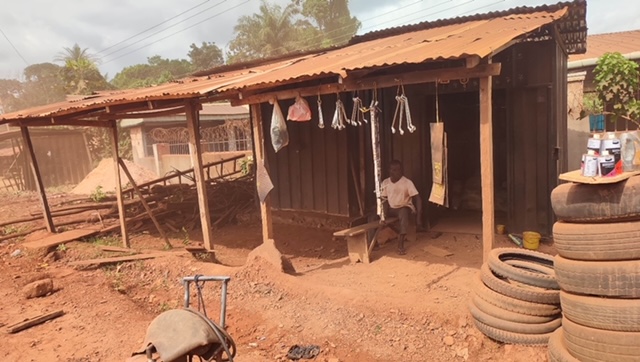
Fredrick Ogbonna cleans his wares every morning due to dust
“That affects my business because people don’t get to see what I sell even though I am along the road“, he said. “Sometimes, the day ends without me making a single sale, no driver wants to stop and buy anything,”.
Ogbonna and other business owners along the road say they have had to treat cough and catarrh got from dust inhalation along the road. Roseline Eze, another resident said that she has had to visit the chemist severally to get medication for her waist due to endless gallops and potholes drivers navigate while plying the road.
“Sometimes, it gets frustrating especially for some of us who do business and have to travel daily,” she said. “We have suffered for years, despite promises by the government,’”.
Car owners, Motorcyclists also bear the brunt
Chukwudi Abonyi, a motorcyclist who plies the Opi end of the road does not recall how many times he has fixed his motorcycle after plying the road. He washes it everyday before he goes to work.
“I am having to spend too much fixing it, “he said. “Some people have had to quit riding along the road because there is no much gain after spending a lot fixing their motorcycle,”.
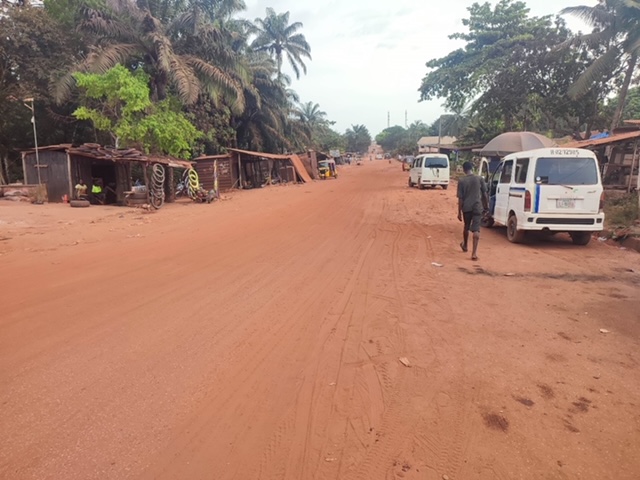
Businesses along the Opi end of the road also bear the brunt
Like Abonyi, commercial drivers who spoke to this reporter said that their vehicles hardly remain the same after travelling along the road. All of these are contributing to the increase in transport fair.
For instance, distances that used to be covered with N200 now cost N1500 and more. From 9th Mile to Okpatu and other nearby communities used to be N800. Now, it costs N2500 or more.
These days, findings show that members of communities along the road hardly return with their own cars for fear of being held up in endless traffic or having to fix them after each journey. They now depend on commercial drivers some of whom have also stopped plying the road. Even when they do, they stop as soon as they see hold up signs and people have to trek back home.
Sources say that robbers often attack travellers, especially when they are stuck in traffic at night. Now, drivers are forced to always abandon their cars and get to town on motorcycles when there is heavy traffic.
Payment delaying completion of work
Okpi blamed the delay in the completion of the project on the failure of government to pay outstanding money being owed the contractor.
“The workers are still on site but they cannot continue till they are paid their money, he said. “The project has not been abandoned and they are only going to their quarry and bringing materials which they stockpile at their construction yard at Abor,”.
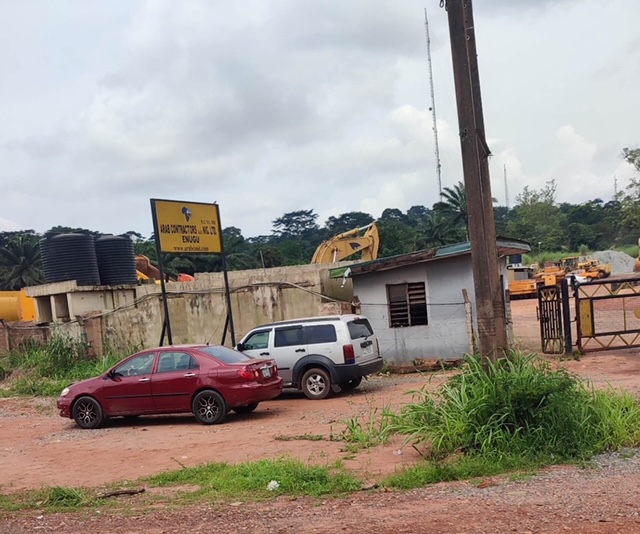
Arab Contractor office along the road
While noting that the contractor will resume work as soon as payment is made, he said that the major problem with road construction is funding because there are several awards of road contract that do not receive adequate payments.
To get Arab contractors to react, this reporter called all three contacts on the website of the company. However, none of the numbers connected. While one of them does not exist, the other ones were switched off.
This reporter also sent an email to nigeria@arabcont.com- which was provided on the website of the company on November 15. But no response was received.
By Arinze Chijioke.
This story was published under the GovSpendMedia Fellowship, supported by Budgit, ICIR and MacArthur Foundation.



